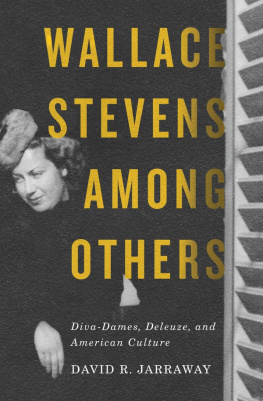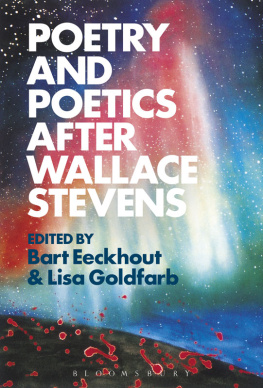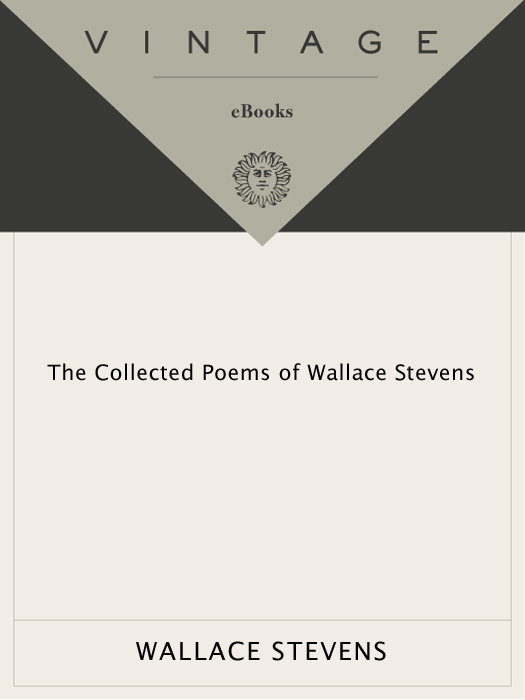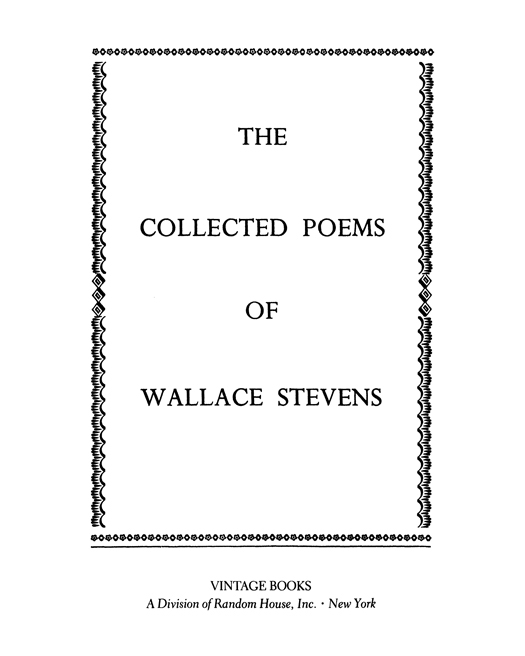
V INTAGE B OOKS E DITION , F EBRUARY 1990
Copyright 1923, 1931, 1935, 1937, 1942, 1943, 1944, 1945, 1946, 1947, 1948, 1950, 1951, 1952, 1954 by Wallace StevensCopyright renewed 1982 by Holly Stevens All rights reserved under International and Pan-American Copyright Conventions. Published in the United States by Vintage Books, a division of Random House, Inc., New York, and simultaneously in Canada by Random House of Canada Limited, Toronto. Originally published by Alfred A. Knopf, Inc., in 1954. Library of Congress Cataloging-in-Publication Data
Stevens, Wallace, 1879-1955.
The collected poems of Wallace Stevens.
Originally published: New York Knopf, 1954.
I. Title.
PS3537.T4753 1982 811.52 82-4735
eISBN: 978-0-307-79187-0 AACR2 v3.1

PHOTOGRAPH BY SYLVIA SALMI
Contents
Frogs Eat Butterflies.
Snakes Eat Frogs. Hogs Eat
Snakes. Men Eat Hogs
Thinking of a Relation between the Images of
Metaphors
HARMONIUM
EARTHY ANECDOTE
Every time the bucks went clattering Over Oklahoma A firecat bristled in the way. Wherever they went, They went clattering, Until they swerved In a swift, circular line To the right, Because of the firecat. Or until they swerved In a swift, circular line To the left, Because of the firecat. The bucks clattered.
The firecat went leaping, To the right, to the left, And Bristled in the way. Later, the firecat closed his bright eyes And slept.
INVECTIVE AGAINST SWANS
The soul, O ganders, flies beyond the parks And far beyond the discords of the wind. A bronze rain from the sun descending marks The death of summer, which that time endures Like one who scrawls a listless testament Of golden quirks and Paphian caricatures, Bequeathing your white feathers to the moon And giving your bland motions to the air. Behold, already on the long parades The crows anoint the statues with their dirt.
IN THE CAROLINAS
The lilacs wither in the Carolinas.
IN THE CAROLINAS
The lilacs wither in the Carolinas.
Already the butterflies flutter above the cabins. Already the new-born children interpret love In the voices of mothers. Timeless mother, How is it that your aspic nipples For once vent honey? The pine-tree sweetens my bodyThe white iris beautifies me.
THE PALTRY NUDE
STARTS ON A SPRING VOYAGE
But not on a shell, she starts, Archaic, for the sea. But on the first-found weed She scuds the glitters, Noiselessly, like one more wave. She too is discontent And would have purple stuff upon her arms, Tired of the salty harbors, Eager for the brine and bellowing Of the high interiors of the sea.
The wind speeds her, Blowing upon her hands And watery back. She touches the clouds, where she goes In the circle of her traverse of the sea. Yet this is meagre play In the scrurry and water-shine, As her heels foam Not as when the goldener nude Of a later day Will go, like the centre of sea-green pomp, In an intenser calm, Scullion of fate, Across the spick torrent, ceaselessly, Upon her irretrievable way.
THE PLOT AGAINST THE GIANT
First Girl When this yokel comes maundering, Whetting his hacker, I shall run before him, Diffusing the civilest odors Out of geraniums and unsmelled flowers. It will check him.
Second Girl I shall run before him, Arching cloths besprinkled with colors As small as fish-eggs.
The threads Will abash him. Third Girl Oh, la le pauvre! I shall run before him, With a curious puffing. He will bend his ear then. I shall whisper Heavenly labials in a world of gutturals. It will undo him.
INFANTA MARINA
Her terrace was the sand And the palms and the twilight.
She made of the motions of her wrist The grandiose gestures Of her thought. The rumpling of the plumes Of this creature of the evening Came to be sleights of sails Over the sea. And thus she roamed In the roamings of her fan, Partaking of the sea, And of the evening, As they flowed around And uttered their subsiding sound.
DOMINATION OF BLACK
At night, by the fire, The colors of the bushes And of the fallen leaves, Repeating themselves, Turned in the room, Like the leaves themselves Turning in the wind. Yes: but the color of the heavy hemlocks Came striding. And I remembered the cry of the peacocks.
The colors of their tails Were like the leaves themselves Turning in the wind, In the twilight wind. They swept over the room, Just as they flew from the boughs of the hemlocks Down to the ground. I heard them crythe peacocks. Was it a cry against the twilight Or against the leaves themselves Turning in the wind, Turning as the flames Turned in the fire, Turning as the tails of the peacocks Turned in the loud fire, Loud as the hemlocks Full of the cry of the peacocks? Or was it a cry against the hemlocks? Out of the window, I saw how the planets gathered Like the leaves themselves Turning in the wind. I saw how the night came, Came striding like the color of the heavy hemlocks I felt afraid.
THE SNOW MAN
One must have a mind of winter To regard the frost and the boughs Of the pine-trees crusted with snow; And have been cold a long time To behold the junipers shagged with ice, The spruces rough in the distant glitter Of the January sun; and not to think Of any misery in the sound of the wind, In the sound of a few leaves, Which is the sound of the land Full of the same wind That is blowing in the same bare place For the listener, who listens in the snow, And, nothing himself, beholds Nothing that is not there and the nothing that is.
THE ORDINARY WOMEN
Then from their poverty they rose, From dry catarrhs, and to guitars They flitted Through the palace walls.
THE ORDINARY WOMEN
Then from their poverty they rose, From dry catarrhs, and to guitars They flitted Through the palace walls.
They flung monotony behind, Turned from their want, and, nonchalant, They crowded The nocturnal halls. The lacquered loges huddled there Mumbled zay-zay and a-zay, a-zay. The moonlight Fubbed the girandoles. And the cold dresses that they wore, In the vapid haze of the window-bays, Were tranquil As they leaned and looked From the window-sills at the alphabets, At beta b and gamma g, To study The canting curlicues Of heaven and of the heavenly script. And there they read of marriage-bed. Ti-lill-o! And they read right long.
The gaunt guitarists on the strings Rumbled a-day and a-day, a-day. The moonlight Rose on the beachy floors. How explicit the coiffures became, The diamond point, the sapphire point, The sequins Of the civil fans! Insinuations of desire, Puissant speech, alike in each, Cried quittance To the wickless halls. Then from their poverty they rose, From dry guitars, and to catarrhs They flitted Through the palace walls.
THE LOAD OF SUGAR-CANE
The going of the glade-boat Is like water flowing; Like water flowing Through the green saw-grass, Under the rainbows; Under the rainbows That are like birds, Turning, bedizened, While the wind still whistles As kildeer do, When they rise At the red turban Of the boatman.














 PHOTOGRAPH BY SYLVIA SALMI
PHOTOGRAPH BY SYLVIA SALMI